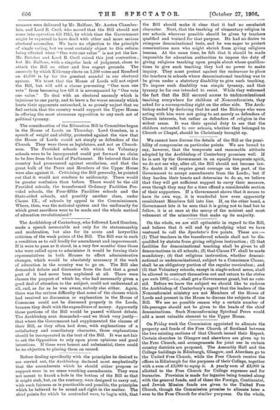Before dealing specifically with the principles he desired to see
carried out, the Archbishop declared most emphatically that the amendments which he should either propose or support were in no sense wrecking amendments. They were not meant to knock a hole in the bottom of the Bill so that it might sink, but, on the contrary, were designed to carry out, with such fairness as is practicable and possible, the principles which he believed to be sound and right in the matter. The chief points for which he contended were, to begin:with, that
the Bill should make it clear that it had 'no secularist character. Next, that the teaching of elementary religion in our schools wherever possible should be given by teachers qualified and trained for that purpose. He had no desire to reimpose denominational tests, and he was eager to protect conscientious men who .might shrink from giving religious lessons. At the same time, he felt that it should be made impossible for education authorities to impose the duty of giving religious teaching upon people about whose qualifica- tions to give such teaching they had no power to make inquiry. They must protest against the endeavour to place the teachers in schools where denominational teaching was to be given under a statutory disability to give such teaching. To impose such disability was simple tyranny, and that tyranny he for one intended to resist. While they welcomed the fact that the Bill secured access to undenominational teaching everywhere for children of Nonconformists, they asked for a corresponding right on the other side. The Arch- bishop ended by declaring that he and the Bishops who were acting with him were not going to act merely as defenders of Church interests, but rather as defenders of religion in the widest sense. It was their special duty to see that the children entrusted to our schools, whether they belonged to Church or Chapel, should be Christianly brought up.














































 Previous page
Previous page